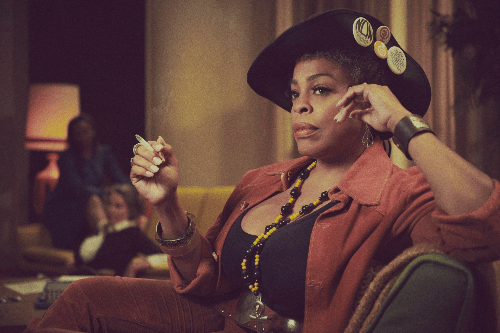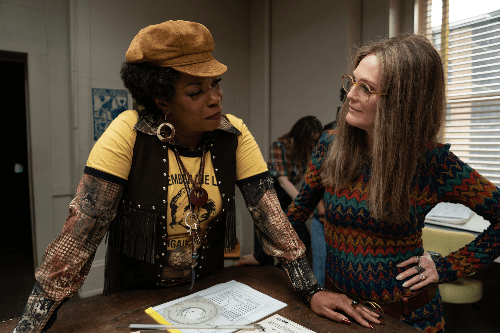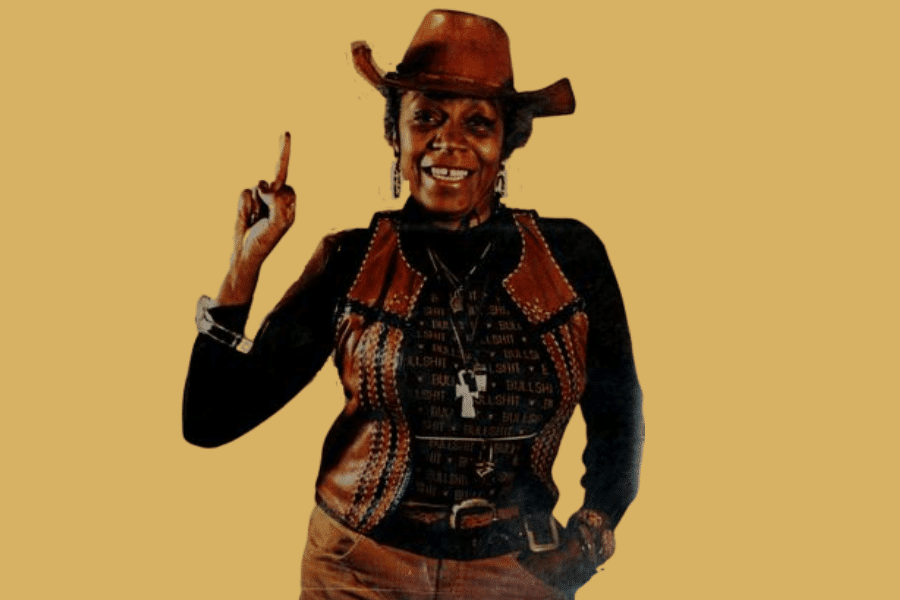The cover of Flo Kennedy’s 1976 memoir, Color Me Flo: My Hard Life and Good Times, says it all. She’s wearing a brown leather vest, a matching cowboy hat, big hoop earrings, and a long sleeve black shirt that says “Bullshit” over and over and over. With a big gap-toothed grin on her face, she’s holding up her middle finger, her nails sculpted and painted a dark red.
Flo (short for Florynce) Kennedy was the flamboyant, outrageous image of the Women’s Movement. An Ivy-League-educated lawyer, Kennedy was sometimes called “radicalism’s rudest mouth.” But beneath the eye-grabbing outfits, the signature pink sunglasses, and the potty mouth was a fierce, brilliant scholar and political tactician who deserves as much recognition as Gloria Steinem and Betty Friedan. Her character makes appearances in both the film The Glorias and the TV series Mrs. America, but more as a supporting role in each.
Her motto was, “Sweetie, if you’re not living on the edge, then you’re taking up space.” Through her 84 years on Earth she did so much more than take up space, and in contrast, way too little space has been taken in history books to note her contributions.
Read More: Ida B. Wells: A Nod of Respect to the Prototypical Bad-Ass
An Early Education

She was young when she got a lesson in how to successfully execute a don’t-mess-with-me stance. Her father, who worked as a Pullman porter and waiter, and later owned a taxi business, was the one who taught her. After the family bought a house in a white neighborhood in Kansas City, Missouri, the Ku Klux Klan showed up to make their displeasure known.
When you want to get to the suites, start in the streets.
“They stood on the sidewalk … and said they wanted to see our daddy,” Kennedy recalled in her memoir. “When Daddy came out, they told him, ‘You have to get out of here by tomorrow.’ [Daddy] brought his gun … out with him and said, ‘Now the first foot that hits that step belongs to the man I shoot. And then after that you can decide who is going to shoot me .’ They went away and they never came back.”
It was a risky gambit, but it worked, and in essence, Kennedy’s life path was set. After her mother died, she and one of her sisters moved to New York City, where she started classes at Columbia University, graduating in 1948. When she applied to Columbia Law School, she was initially barred, not for her race, but her sex, the dean told her. She made enough racket that eventually she was admitted and in 1951, became the second African-American woman to graduate from the law school.
Mixing It Up
In private law practice in Manhattan, she took high profile cases, defending Civil Rights activists, including a few Black Panthers, and the estates of Billie Holiday and Charlie Parker.
I never stop to wonder why I’m not like other people. The mystery to me is why more people aren’t like me.
In the ’60s, she ramped up her activism against racism, sexism, and homophobia. She organized boycotts and protests that got attention and results. A fellow activist recalls that Kennedy once said, “When you want to get to the suites, start in the streets.”
Along with Steinem and Friedan, Kennedy helped found the Women’s Political Caucus and was an original member of the National Organization for Women. She also launched the National Black Feminist Organization and the Feminist Party, which nominated Shirley Chisolm for president in 1971.
One of her most memorable actions was what became known as “The Great Harvard Pee-in of 1973.” Protesting the lack of bathrooms for women at the university, Kennedy and a group of activists showed up with jars of fake urine and poured them on the steps of the school’s Lowell Hall.
Her Legacy

Writer Dahvi Waller, the creator of the Mrs. America series, told the Los Angeles Times that it was a “gross failure that Kennedy isn’t more widely recognized.” She sees Kennedy as a true pioneer because she was “one of the first women to speak about the intersection of sexism and racism and the connections between Black Power and the feminist movement.”
Still, some reviews of Mrs. America contend that there just wasn’t enough of Kennedy and other important but under-appreciated activists in the series. “Am I wrong for wishing I could trade half of Schlafly, Steinem, or Friedan’s screen time for a more substantive look at these women’s stories?” wrote Emily Specter of Mrs. America in Vogue.
Maybe it’s time for a bio-pic about Flo Kennedy. (Are you listening Regina Hall?) After all, who wouldn’t want to know more about a woman who wrote this in her memoir: “I’m just a loud-mouthed middle-aged colored lady with a fused spine and three feet of intestines missing and a lot of people think I’m crazy. Maybe you do too, but I never stop to wonder why I’m not like other people. The mystery to me is why more people aren’t like me.”
Read More: Sister Rosetta Tharpe: A Trailblazing Guitar Goddess Who Was Overlooked Far Too Long





















0 Comments